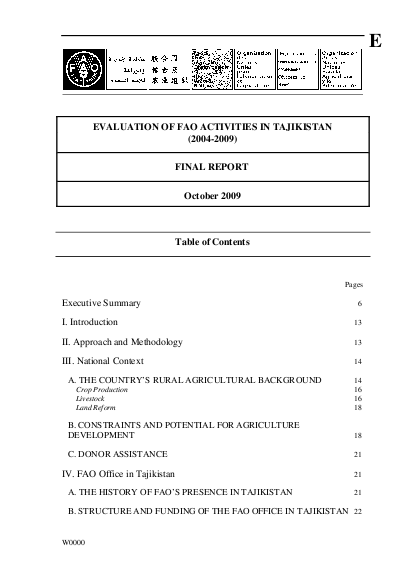
The evaluation reviews FAO activities in Tajikistan for the five-year period 2004 to 2009, with a view towards improving the relevance, effectiveness, efficiency and impact of its work; providing accountability about performance and assessing the role of FAO in a transition from emergency assistance to a more normal development mode. Throughout the period, and despite increased economic growth as the country emerged from the effects of civil war, the economy of Tajikistan remained fragile. The country faces a number of challenges, including in the agricultural sector. There has been a chronic absence of reliable household income for the rural population which has been exacerbated by periodic years of drought, the last being 2007/2008. There is a continuing high level of rural poverty. The poorest groups of the population spend over 70 percent of their income on food and a sizeable level of the population is subject to chronic or seasonal food insecurity.
Within the context of this challenging environment, the evaluation examined 42 projects that were implemented by FAO in Tajikistan during the review period. Of these, 30 were purely national projects and 12were global or regional projects in which Tajikistan participated to various degrees. The nature of FAO activities in Tajikistan has changed over the years from almost exclusively input distribution to more development-oriented activities such as establishment of veterinary field units, livestock and pasture rehabilitation, land reform, watershed management and food security issues. The evaluation also examined the work of the FAO Coordination Office in the country. One of the chief reasons for undertaking the Tajikistan country evaluation was to assess the performance of FAO in a period of transition from emergency to development. In addition this was the first country evaluation where there has not been a resident FAO Representation.